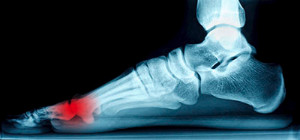 If an injury from overuse of the tendons in the foot should occur, it may be a condition known as sesamoiditis. The bones in the feet that are connected to the muscles are referred to as sesamoids, and the surrounding area may become inflamed and tender if an injury should happen. This is a condition that is commonly seen in athletes and ballet dancers, and may also develop as a result of wearing poorly fitting shoes or high heels. It’s important to obtain a proper diagnoses, and this can be accomplished by visiting a podiatrist who will check for tenderness around the ball of the foot. Treatment may begin with ceasing any activity that caused sesamoiditis. Research has shown the importance of keeping pressure off the sole of the foot in addition to elevating the affected foot. If extra cushioning is needed, please consult with a podiatrist for information about custom-made orthotics.
If an injury from overuse of the tendons in the foot should occur, it may be a condition known as sesamoiditis. The bones in the feet that are connected to the muscles are referred to as sesamoids, and the surrounding area may become inflamed and tender if an injury should happen. This is a condition that is commonly seen in athletes and ballet dancers, and may also develop as a result of wearing poorly fitting shoes or high heels. It’s important to obtain a proper diagnoses, and this can be accomplished by visiting a podiatrist who will check for tenderness around the ball of the foot. Treatment may begin with ceasing any activity that caused sesamoiditis. Research has shown the importance of keeping pressure off the sole of the foot in addition to elevating the affected foot. If extra cushioning is needed, please consult with a podiatrist for information about custom-made orthotics.
Sesamoiditis is an unpleasant foot condition characterized by pain in the balls of the feet. If you think you’re struggling with sesamoiditis, contact Dr. Sharon Pletcher of Pennsylvania. Our doctor will treat your condition thoroughly and effectively.
Sesamoiditis
Sesamoiditis is a condition of the foot that affects the ball of the foot. It is more common in younger people than it is in older people. It can also occur with people who have begun a new exercise program, since their bodies are adjusting to the new physical regimen. Pain may also be caused by the inflammation of tendons surrounding the bones. It is important to seek treatment in its early stages because if you ignore the pain, this condition can lead to more serious problems such as severe irritation and bone fractures.
Causes of Sesamoiditis
- Sudden increase in activity
- Increase in physically strenuous movement without a proper warm up or build up
- Foot structure: those who have smaller, bonier feet or those with a high arch may be more susceptible
Treatment for sesamoiditis is non-invasive and simple. Doctors may recommend a strict rest period where the patient forgoes most physical activity. This will help give the patient time to heal their feet through limited activity. For serious cases, it is best to speak with your doctor to determine a treatment option that will help your specific needs.
If you have any questions please feel free to contact our office located in State College, PA. We offer the newest diagnostic and treatment technologies for all your foot and ankle needs.
Read more about Sesamoiditis



